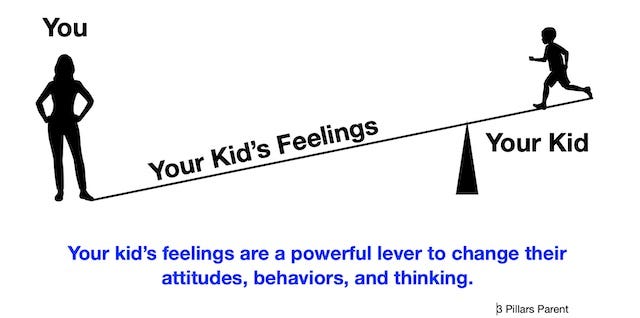Feelings are powerful.
Targeting your kid’s emotions is one of the most powerful tools in your parenting toolbox.
Parenting Matters #56
By: Catherine Lynch and Glenn Collins
Dear Awesome parent,
Your kids have BIG feelings, and you have a ridiculous amount of power to affect their feelings…to make them feel better, or worse, and use those feelings to sway their behavior. It can take a lot of effort to go against our natural tendencies to take the easy path - to use the bad feelings of guilt, shame, and fear to make them do what we want. Here’s a story, and a primer, on how to get what you want, help them feel good, and continue to be a significant influencer in their lives.
Did you notice? We changed our name. Why? Because one of readers noted that she often misses our emails because they show up as “The Art and ….” and she thinks it’s just another email from her daughter’s art school. So she doesn’t open them! So now our name is Parenting Matters. Because, well, parenting does matter! And it starts with the word Parenting, so more people will know what it’s about when they see it in their inbox!
“If you don’t stop crying, your grandparents won’t come visit you anymore.”
We were at a party recently and heard a father say this to his frustrated 8 year old son. The boy’s sisters were coloring pictures for their grandparents and he wanted to do the same. He had a new coloring book, but couldn’t find it and thought his little sister had lost it. He tried to get his parents to help him find it but they were busy talking with their guests, and kept hushing him.
The frustration finally became too much and he started crying. That certainly got his parents’ attention. They were embarrassed by his behavior (they believe boys shouldn’t cry) and it was interrupting their adult conversation. They wanted the crying to stop and they wanted it to stop right away. That’s when the father issued the threat about the grandparents not coming to visit anymore.
And it worked. Sort of. The crying stopped. But only because the son left the room. The crying actually got worse before he left because, in addition to not being able to find his book, he now had to deal with the possibility that his beloved grandparents might not come visit due to his crying!
Fear is a great motivator. We all know this. And the father knew it too. He used his son’s love for his grandparents and the threat of not seeing them to induce fear. A fear he hoped would produce the behavior he wanted.
And it wasn’t even true. We talked with the grandparents later, and learned that they were upset by what happened but were also conflicted over what to do about it. They would never not visit because one of their grandkids had cried, but they also hadn’t wanted to correct their son in front of his kids and guests. They said they were going to speak to their son and ask him not to make threats in their name.
You would probably look at a situation like this and say “Oh my god, that’s terrible. How could that father do that to his kid! That’s just wrong.” And you’re right. It was an underhanded and unnecessarily traumatic method to get his son to stop crying. Something he could have handled in any number of ways that would have achieved his goals and not made his son feel bad. It was emotional manipulation.
Your kids’ feelings are potent levers you can use to shape their beliefs, attitudes, and behaviors. Who hasn’t steered their kids’ emotions to change the way they’re acting? We certainly have, and it’s not always pretty. Maybe you don’t lie or use fear, but when your kids misbehave, have you ever made them feel guilty? (Guilt is so common - who here hasn’t seen a guilty dog video???) How about when they’re unenthusiastic… have you used your cheerful, excited voice to get them interested? When frustrated, have you ever shown your anger to get your way? When you do things like this, you’re getting them to feel something in order to get them to do something different from what they’re currently doing.
Targeting your kid’s emotions is an incredibly powerful tool in your parenting toolbox. Like all powerful tools, you have to be careful how you apply it because there is a real risk of unintended consequences. How your kid feels when they’re interacting with you forms the foundation of how they feel about you. And how they feel about you is at the core of your relationship with them.
Make them feel bad often enough, and they won’t want to be around you. Won’t want to talk to you. And definitely won’t want to listen to you. They’ll find other people to talk to, listen to, and hang out with. People they feel good about, and who make them feel good about themselves. Those are the people who will have influence with your kid.
The converse is also true. If your kids consistently feel good about their interactions with you they’ll want to spend time with you, talk to you, and listen to you. You’ll remain an influencer in their life. (“Consistently” doesn’t mean all the time, just “most of the time”. (Recall the Gottman’s magic 5:1 ratio - Here’s a link to our article about it).
Let’s take a closer look at this interaction from the perspective of the son’s feelings.
What might the son be feeling when he was trying to get his father’s attention?
Sad
Angry
Frustrated
Powerless
Humiliated
Whatever he was feeling, it was predominantly bad. He definitely wasn’t feeling good about himself, his Dad, or their interaction.
What might the son be thinking when his Dad wouldn’t help him find his coloring book?
It’s not fair.
Dad doesn’t care how I feel.
Nobody listens to me.
I hate my sister.
Dad won’t help me.
Whatever he was thinking, it wasn’t anything good. He wasn’t thinking he wanted to hang out with Dad even more. He wasn’t thinking how wise Dad was, how much he loved him, and how he wanted to be just like him when he grew up.
Your kids are incredibly attuned to you. Every word. Every gesture. Your tone of voice and your body language. They all speak volumes. What messages might the son be getting from his dad’s words and actions? Messages the dad might not even be aware he’s sending?
What you want isn’t important to me.
You’re bothering me.
I don’t care how you feel.
Boys aren’t supposed to cry or show their feelings.
My guests are more important than you.
What are some possible long term consequences if the dad keeps making his son feel bad just to get the behavior he wants?
His son may avoid his dad and spend most of his time with his friends, in his room, or on his devices.
His son might not trust him enough to ask for help in the future.
His son might lie about what he’s doing, where he’s going, and with whom.
His Dad might not be his main male influencer - it might be other men he prefers to spend time with because he feels good when he’s with them.
What are some things the dad have done instead?
Excused himself so he could tend to his son.
Listened to his son and empathized with his frustration.
Helped his son find the missing book.
Suggested other ways his son could make a picture for his grandparents.
Suggested a different activity his son liked.
We have all been this Dad.
We’ve said or done things in the heat of the moment that we’ve regretted. That we’d take back if we could. If that’s you (and we’ve done it too) what should you do now?
Try this:
Acknowledge that you over-reacted and said something you now regret.
Apologize. This doesn’t make you look weak. In fact, it makes you look even more powerful, because you have to be strong to admit your mistakes. It makes you look human. It shows that you’re not perfect, and frees your kid from the burden of feeling like they have to be perfect.
Ask for a do-over. Re-create the situation. Say the thing you wish you’d said the first time.
Forgive yourself for not being perfect.
Join a local group of parents you trust and share your dilemmas with them. Can’t find one? Join our free, confidential online parent mastermind at 10am EST on Thursdays to get a fresh perspective on your parenting challenges. HERE’S THE LINK to set up a quick call with us to find out more about it.
Green Tree Frog on a Bromeliad in our front yard. Notice the spines on the leaf - they’re there to discourage animals from eating them. Notice the color of the frog - he/she is well camouflaged to (hopefully) avoid being seen and eaten by predators.






